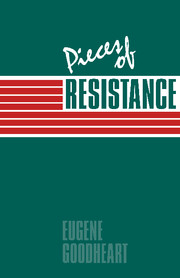Book contents
- Frontmatter
- Contents
- Preface
- Acknowledgments
- Autobiographical
- Part I Critics and criticism
- Part II Contemporary culture in conflict
- 8 The New York Review: a close look
- 9 The new Apocalypse
- 10 Eros, politics, and pornography: a decade with Evergreen Review
- 11 The deradicalized intellectuals
- 12 The New York Review loves an Englishman
- Part III Writing in America and elsewhere
11 - The deradicalized intellectuals
Published online by Cambridge University Press: 05 August 2012
- Frontmatter
- Contents
- Preface
- Acknowledgments
- Autobiographical
- Part I Critics and criticism
- Part II Contemporary culture in conflict
- 8 The New York Review: a close look
- 9 The new Apocalypse
- 10 Eros, politics, and pornography: a decade with Evergreen Review
- 11 The deradicalized intellectuals
- 12 The New York Review loves an Englishman
- Part III Writing in America and elsewhere
Summary
The movement of the political pendulum doesn't characterize the general population, whose conservative instincts have been fairly reliable, but rather the volatile “intelligentsia,” which seems to thrive on changes of opinion and mood. Thus, since we have begun to mark our “progress” by decades, it was inevitable that after the radical sixties a conservative reaction would begin to emerge in the seventies. One of the visible signs of this reaction is the current editorial policy of Commentary. As Nathan Glazer remarks in a recent article on his deradicalization, Commentary in the early fifties had given some impetus to the formation of a new radical conscience in America by, for instance, bringing the work of Paul Goodman into prominence. Now apparently viewing the work of this conscience during the past several years, Commentary has decided it has had enough and is openly espousing the “conservative” cause. Thus Norman Podhoretz remarks editorially, apropos of Glazer's article:
In 1970 some of us who came a decade earlier to radicalism via the route of ideas rather than the route of personal grievance are convinced that it has become more important to insist once again on the freedom of large areas of human experience from the power of politics, whether benevolent or malign, than to acquiesce in the surly tyranny of the activist temper in its presently dominant form. It is in this sense that we consider ourselves deradicalized, and not out of any sudden lapse into indifference over the remediable ills which afflict the world and to whose removal the spirit of radical activism has come to stand, for all practical purposes, in a stubborn and perverse and most intractable opposition.
- Type
- Chapter
- Information
- Pieces of Resistance , pp. 102 - 109Publisher: Cambridge University PressPrint publication year: 1987



